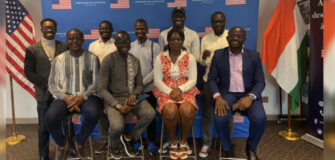India and Kenya forge alliance to expand Africa’s space capabilities in response to climate crisis
Share
Partnership aims to harness space technology for sustainable development, accurate early warning systems for rural farmers and addressing food security
India has expressed interest in exploring areas of partnership and seeking avenues of collaboration with Kenya in developing and expanding Africa’s space capabilities for predicting and monitoring extreme weather events.
Speaking at the Kenya Space Expo & Conference in Nairobi, the Indian High Commissioner to Kenya, Ambassador Namgya Khampa, said the two countries are strategic partners and are keen on capacity building for geospatial information networks.
“We believe in strong international partnerships and we intend to leverage this together with Kenya and other partners in Africa,” said Khampa, who hailed Kenya for positioning itself as a strategic global partner in the future of space exploration.
“Besides capacity building, we intend to work together to build awareness and a vibrant discourse on how the space sector can benefit African economies, especially in areas of science and technology, in response to common challenges like the ongoing climate crisis,” the ambassador added.
Khampa highlighted India’s remarkable space technology journey. “Known for its cost-effective approach, Indian Space Research Organisation (ISRO) has become a leading space programme globally. India is eager to partner with other countries like Kenya to help them develop indigenous space capabilities, addressing critical challenges in agriculture, food security, and environmental issues,” she added.
Speaking at the three-day expo, Kenya’s Cabinet Secretary for Environment and Climate Change, Soipan Tuya, welcomed India’s technical assistance and called for closer collaborations in space science. Tuya also highlighted the strategic importance of Kenya becoming an active player in the global space economy, projected to grow from $635 billion in 2023 to $1.8 trillion in 2035.
“Space technology and science will soon be key in addressing food security,” said Cabinet Secretary Tuya. She highlighted that partnerships will enable Kenya to access accurate early warning systems for rural farmers. Integrating space technology provides unparalleled opportunities, such as enhanced data for informed decision-making, shifting from reactive approaches. Real-time monitoring and climate change mitigation are crucial for Kenya’s sustainable development.
Kenya’s Cabinet Secretary for Defence Aden Duale, under whose ministry the Kenya Space Agency falls, underscored the importance of the event in advancing the conversation around space technologies and their transformative impact on society.
“In the spirit of intra-Africa cooperation and as envisioned in the African Union Agenda 2063, Kenya is already actively pursuing collaboration initiatives on the peaceful uses of outer space with partner states in the region. These include, but are not limited to, the Republic of South Africa, Angola, Rwanda, Uganda, Ethiopia, Sudan, Egypt, Algeria, Nigeria and Ghana,” said Duale.
He added that the collaboration initiatives are targeted at developing indigenous capacity in space systems engineering and enhanced utilisation of space services, technologies and applications in socio-economic development through joint projects.
Duale also announced plans to establish a Centre for Earth Observation at the Luigi Broglio Malindi Space Centre on the Kenyan coast, as well as an International Training Centre for Space Education in partnership with the Italian Space Agency. The centres will enhance national and regional capabilities through the training and apprenticeship of the next generation of space professionals.
The Space Expo & Conference concluded with calls for more resources to be allocated to sustainable space-related activities, including accurate monitoring and prediction of weather and climate events such as floods and droughts in East Africa and across the continent.
The three-day expo, themed ‘Space technology for societal benefits’, sought to enhance awareness of the exploration and exploitation of space opportunities for societal benefits like the fight against climate change and national socio-economic development by showcasing successful cases of innovations.
Several other speakers, including engineers and scientists, acknowledged the crucial role that the space economy can play in socio-economic development, particularly in implementing Kenya’s national development blueprint, Vision 2030. The expo attracted more than 400 delegates drawn from Kenya and at least 12 other nations from around the world.
Experts at the conference recommended that African governments support the private sector in developing innovations for data commercialisation across sectors. They also explored funding models and strategies to de-risk the space sector. Key takeaways included boosting national capability in space science, breaking entry barriers for women, and promoting STEM education.
Source: https://www.downtoearth.org.in/
You Might also Like








